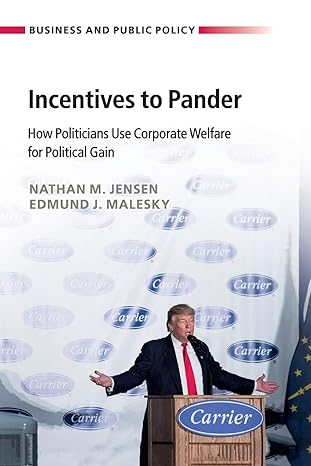Go back


Incentives To Pander How Politicians Use Corporate Welfare For Political Gain(1st Edition)
Authors:
Nathan M. Jensen ,Edmund J. Malesky

Cover Type:Hardcover
Condition:Used
In Stock
Include with your book
Free shipping: April 03, 2024Popular items with books
Access to 3 Million+ solutions
Free ✝
Ask 10 Questions from expert
200,000+ Expert answers
✝ 7 days-trial
Total Price:
$0
List Price: $35.99
Savings: $35.99(100%)
Book details
ISBN: 1108408532, 978-1108408530
Book publisher: Cambridge University Press
Get your hands on the best-selling book Incentives To Pander How Politicians Use Corporate Welfare For Political Gain 1st Edition for free. Feed your curiosity and let your imagination soar with the best stories coming out to you without hefty price tags. Browse SolutionInn to discover a treasure trove of fiction and non-fiction books where every page leads the reader to an undiscovered world. Start your literary adventure right away and also enjoy free shipping of these complimentary books to your door.
Incentives To Pander How Politicians Use Corporate Welfare For Political Gain 1st Edition Summary: Policies targeting individual companies for economic development incentives, such as tax holidays and abatements, are generally seen as inefficient, economically costly, and distortionary. Despite this evidence, politicians still choose to use these policies to claim credit for attracting investment. Thus, while fiscal incentives are economically inefficient, they pose an effective pandering strategy for politicians. Using original surveys of voters in the United States, Canada and the United Kingdom, as well as data on incentive use by politicians in the US, Vietnam and Russia, this book provides compelling evidence for the use of fiscal incentives for political gain and shows how such pandering appears to be associated with growing economic inequality. As national and subnational governments surrender valuable tax revenue to attract businesses in the vain hope of long-term economic growth, they are left with fiscal shortfalls that have been filled through regressive sales taxes, police fines and penalties, and cuts to public education.
Customers also bought these books
Frequently Bought Together
Top Reviews for Books
Request tih5jq0
( 4 )
"Delivery was considerably fast, and the book I received was in a good condition."










